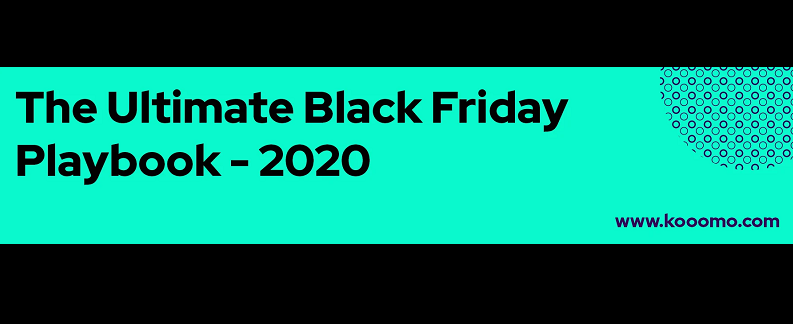Global eCommerce platform Kooomo advises retailers to use last year’s cyber-weekend as inspiration for their future response.
Characterised by bargain hunters, busy stores and hefty queues, the Black Friday and Cyber Monday weekend is undoubtedly one of the most significant shopping events of the year. However, shopping habits once viewed as the social norm are now taboo in the COVID era, meaning it is almost impossible to predict how this year’s cyber-weekend will transpire. With this in mind, global eCommerce platform Kooomo, has taken a look back at Black Friday 2019 (as part of the company’s ultimate Black Friday 2020 playbook) and drawn out some of the key lessons for retailers looking to remain competitive amid this year’s peak period.
The vast uncertainty surrounding cyber-weekend 2020 is exemplified by a recent survey conducted by Contentsquare – carried out across 1,000 UK shoppers – which found that 91% plan to avoid physical stores this Black Friday.[1] Unsurprisingly, the survey also suggests this year’s cyber-weekend will witness a large jump in digital purchases as consumers opt for nabbing their desired products online to avoid close contact with others.
Ciaran Bollard, CEO at Kooomo, explains: “As the second wave of COVID-19 sweeps through the nation, alongside the vast economic uncertainty that comes hand in hand with this, it is anyone’s guess to how this year’s Black Friday will pan out. One thing we are certain of, however, is that the power is most definitely in the hands of the consumer, who is now extremely well-versed in online services. Retailers must therefore reflect on last year’s Black Friday to better understand consumer demand and learn from past mistakes if they stand any hope of remaining competitive amid this year’s cyber-weekend.”
In light of this, Ciaran outlines his top four takeaways from Black Friday 2019 and how retailers can improve the overall experience this year:
- Consumers opt for retailers who offer an omnichannel experience
“First and foremost, one of the most important findings from last year’s cyber-weekend is that omnichannel shopping grew by 43%.[2] While many retailers might not think this is significant this year – with traditional footfall witnessing a dramatic decline over the past few months – consumers still desire synchronisation and access to products across a variety of sales channels, from online to in-store via Click and Collect services. Online shopping might have bridged the gap between safety and continued purchasing, but it still does not provide the instant gratification which Click and Collect services can satisfy to a certain degree. In short, the omnichannel experience is still important this Black Friday, it will just look different to previous years.”
- M-commerce is increasingly popular
“Leading on from the omnichannel experience, M-commerce also witnessed an immense surge in popularity throughout last year’s cyber-weekend, calling for retailers to get to grips with every sales platform. This vast increase in demand is exemplified by a survey from Internet Retailing which found that M-commerce made up 71% of overall sales on Black Friday 2019.[3] Ultimately, we expect this year will witness the largest use of M-commerce yet, meaning retailers must ensure their eCommerce experience is able to respond to demand with mobile-first design and checkout.”
- Consumers desire a seamless online experience
“Another significant takeaway from Black Friday 2019 is that consumers lack patience when it comes to buying products online. In fact, research by Google found that poor-loading time caused 53% of shoppers to abandon their carts[4], thereby highlighting that consumers will simply switch to sites that already offer speed, reliability and ease of use. From hyper-personalised offers landing in their inbox to a fast and efficient checkout process online, improving the flow of the customer journey will greatly improve retailer’s competitive stance-point this cyber-weekend.”
- It’s not all about discounts
“And finally – not what you would expect from an event centred around saving money – Black Friday is not all about discounts. Throughout cyber-weekend 2019, we witnessed a distinct shift towards offering alternative discounts such as free shipping and increased participation in events such as Green Friday and Giving Friday. Shoppers are a lot savvier and conscious than ever before, particularly in the current climate, meaning retailers must be considered about the discounts on offer. Promotions should be devised carefully, reflecting the ideals of the conscious user.”
Ciaran Bollard concludes: “Ultimately, last year’s cyber-weekend should be used as a learning curve to inspire retailers’ future response. No-one is quite sure on what to expect from this year’s Black Friday and the only way to plan ahead is to listen to the needs of the consumer. Retailers must therefore get the basics covered, invest more heavily in their eCommerce infrastructure and respond quickly to changing consumer demand if they wish to remain competitive amid this year’s cyber-weekend.”
For further information on how to prepare for this year’s cyber-weekend, download Kooomo’s Black Friday 2020 playbook.
Source: www.kooomo.com

